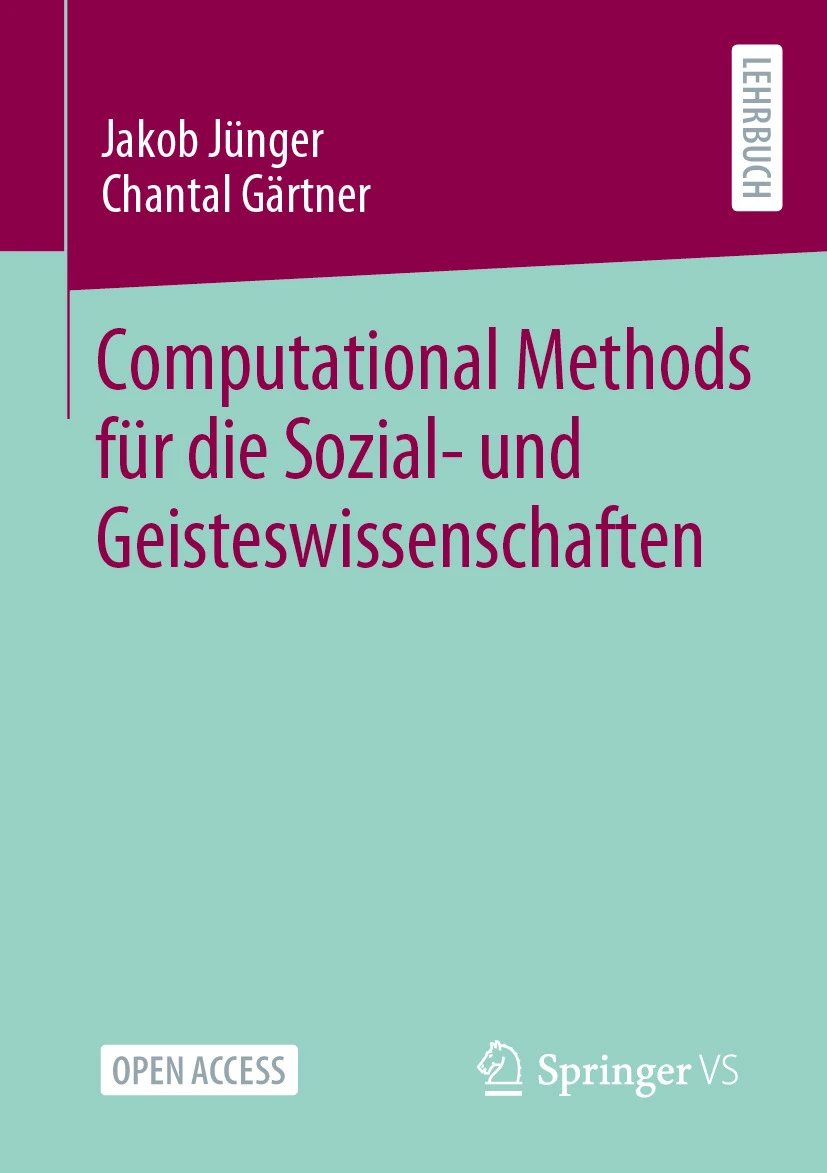In der letzten Zeit sind u.a. diese frei verfügbaren Titel erschienen:
Computational Methods für die Sozial- und Geisteswissenschaften
Jakob Jünger & Chantal Gärtner
https://doi.org/10.1007/978–3‑658–37747‑2
Mit Computational Methods lassen sich digitale Welten wissenschaftlich erforschen und gestalten. Das Open-Access-Lehrbuch vermittelt zunächst grundlegende Kompetenzen für die automatisierte Erhebung und Aufbereitung von Daten und für den Umgang mit Datenbanken. Eine Einführung in die Programmiersprachen R und Python sowie in Versionsverwaltungen und Cloud-Computing eröffnet Wege für kreative Analyseansätze beim Umgang mit großen und kleinen Datensätzen. Schließlich werden Szenarien in sozial- und geisteswissenschaftlichen Anwendungsfeldern durchgespielt. Dazu zählen die automatisierte Datenerhebung über Programmierschnittstellen und Webscraping, automatisierte Textanalysen, Netzwerkanalysen, maschinelles Lernen und Simulationsverfahren. Neben einer konzeptionellen Einführung in die jeweiligen Themenfelder geht es vor allem darum, in kurzen Tutorials selbst erste praktische Erfahrungen zu sammeln sowie weiterführende Möglichkeiten, aber auch Limitationen, von Computational Methods kennenzulernen.
Digital Humanities and Libraries and Archives in Religious Studies: An Introduction
Clifford B. Anderson (Hrsg.)
https://doi.org/10.1515/9783110536539
How are digital humanists drawing on libraries and archives to advance research and learning in the field of religious studies and theology? How can librarians and archivists make their collections accessible to digital humanists?
The goal of this volume is to provide an overview of how religious and theological libraries and archives are supporting the nascent field of digital humanities in religious studies. The volume showcases the perspectives of faculty, librarians, archivists, and allied cultural heritage professionals who are drawing on primary and secondary sources in innovative ways to create digital humanities projects in theology and religious studies. Topics include curating collections as data, conducting stylometric analyses of religious texts, and teaching digital humanities at theological libraries.
The shift to digital humanities promises closer collaborations between scholars, archivists, and librarians. The chapters in this volume constitute essential reading for those interested in the future of theological librarianship and of digital scholarship in the fields of religious studies and theology.
R for Data Science
Hadley Wickham, Mine Çetinkaya-Rundel & Garrett Grolemund
https://r4ds.hadley.nz/ – 2. Auflage
This book will teach you how to do data science with R: You’ll learn how to get your data into R, get it into the most useful structure, transform it and visualize.
In this book, you will find a practicum of skills for data science. Just as a chemist learns how to clean test tubes and stock a lab, you’ll learn how to clean data and draw plots—and many other things besides. These are the skills that allow data science to happen, and here you will find the best practices for doing each of these things with R. You’ll learn how to use the grammar of graphics, literate programming, and reproducible research to save time. You’ll also learn how to manage cognitive resources to facilitate discoveries when wrangling, visualizing, and exploring data.


